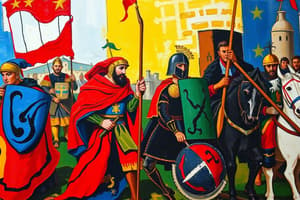Podcast
Questions and Answers
What was one of the impacts of the Black Death on Europe?
What was one of the impacts of the Black Death on Europe?
- Emergence of scientific advancements
- Labor shortage and rise in wages (correct)
- Decline of centralized monarchies
- Development of new military tactics
Which event marked a turning point in the balance of power from feudal lords to monarchs?
Which event marked a turning point in the balance of power from feudal lords to monarchs?
- The decline of feudalism
- The emergence of new religious movements
- The Renaissance
- The Hundred Years' War (correct)
In which century did the Renaissance begin in Italy?
In which century did the Renaissance begin in Italy?
- 14th century (correct)
- 15th century
- 12th century
- 17th century
What characterized the Medieval History period as discussed in the text?
What characterized the Medieval History period as discussed in the text?
What impact did the Hundred Years' War have on feudalism?
What impact did the Hundred Years' War have on feudalism?
Study Notes
Unraveling the Woven Tapestry of Medieval History
The journey through time unveils a captivating era, a tapestry woven with threads of war, religion, trade, culture, and much more. This exploration delves into the heart of Medieval History, a time of change and transformation that left a lasting impression on our world.
The Rise of Feudalism
The foundation of Medieval History is rooted in the development of feudalism, a system of land tenure and social organization that emerged in Europe during the 9th and 10th centuries. Feudalism brought a new balance of power between the monarch, the nobility, and the common people. Lords who received land grants known as fiefs, in return for military service, established a complex network of alliances and obligations that shaped the political landscape.
The Crusades
One of the pivotal events of Medieval History was the series of military campaigns known as the Crusades. From the late 11th century until the 13th century, successive European Christian armies sought to reclaim the Holy Land from Muslim rule. The Crusades had far-reaching consequences, both political and cultural. The balance of power in the Mediterranean shifted, and trade routes between Europe and the Middle East were disrupted. The Crusades also introduced new ideas, art, and architecture to Europe.
The Black Death
The Black Death, a devastating bubonic plague pandemic that swept across Europe in the 14th century, drastically altered the course of Medieval History. The plague killed an estimated 25 million people, or 60% of the European population. The loss of life led to a labor shortage and a rise in wages, which benefited the common people. However, the Black Death also led to social unrest and the emergence of new religious movements.
The Hundred Years' War
The Hundred Years' War, fought from 1337 to 1453, was a protracted conflict between England and France over the French throne. The war had a profound impact on the history of Europe. It saw the emergence of new military tactics, such as the longbow and the siege artillery. The war also led to the decline of feudalism and the rise of centralized monarchies. The Hundred Years' War marked a turning point in the history of Europe, as the balance of power shifted from feudal lords to monarchs.
The Renaissance
The Renaissance, a period of cultural, artistic, political, and economic "rebirth" that began in Italy in the 14th century, was a direct result of the events of Medieval History. The Renaissance saw the emergence of new ideas, art, and architecture that would shape the world for centuries to come. The Renaissance also marked the end of the Middle Ages and the beginning of the Early Modern Period.
Medieval History is a fascinating era that offers a unique perspective on the evolution of human society. A period of transformation and adaptation, the Middle Ages gave birth to new ideas, art, and cultural expressions that continue to shape our world today. By understanding the complexities of Medieval History, we can gain a deeper appreciation for the events that have shaped our past and continue to influence our present and future.
Studying That Suits You
Use AI to generate personalized quizzes and flashcards to suit your learning preferences.
Description
Delve into the vibrant tapestry of Medieval History, a fascinating era defined by war, religion, trade, culture, and more. From the rise of feudalism to the impact of the Crusades, Black Death, Hundred Years' War, and the birth of the Renaissance, this journey through time offers a captivating insight into the evolution of human society.




